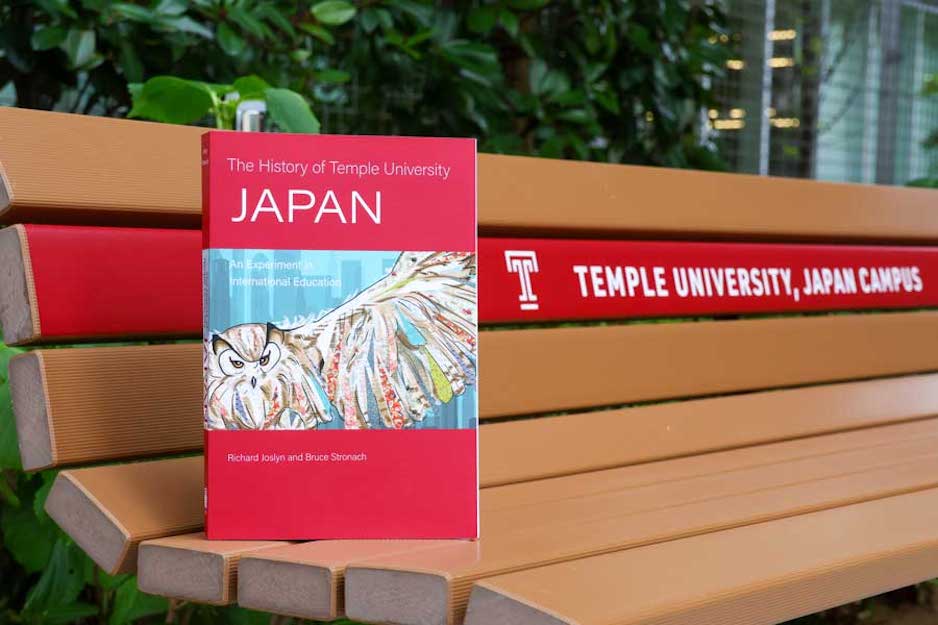Temple University, Japan Campus (TUJ) has announced the publication of The History of Temple University Japan: An Experiment of International Education by Temple University Press. Co-authored by former TUJ deans Richard Joslyn and Bruce Stronach, this book chronicles TUJ’s remarkable four-decade history, capturing its evolution as the sole campus of an American University in Japan offering full undergraduate and graduate degree programs. Throughout the journey, TUJ has established itself as a renowned international institution of higher education in the country.
The book offers readers an in-depth exploration of the academic program’s development, the recruitment of students, and the unwavering support from Temple’s Main Campus in Philadelphia that has facilitated continuous improvements in curriculum and pedagogy. Through extensive research and experience, the authors provide insight into the interconnected tapestry of U.S.-Japanese relations throughout the institution’s history.
Bruce Stronach, who served as president of Yokohama City University before becoming TUJ dean in 2008 until 2020, emphasizes the campus’ vital role in facilitating cultural exchange between the United States and Japan. “There is much to accomplish in Japanese-American educational and cultural relations to create a truly global educational experience for each country’s universities. This book is a great blueprint of how to develop an effective overseas campus and, through that, educate students from around the world in a context that goes beyond the limiting designations of Japanese or American,” he said.
Richard Joslyn, Temple University Main Campus professor emeritus who served as Japan campus dean from 1996 to 2001, reflected on TUJ’s history and highlighted its commitment to providing a global educational experience. “Reflecting on TUJ’s history over the last four decades, it is remarkable how it has matured into a prosperous and accomplished institution,” he said.
“Overcoming the initial hostility from the Japanese government, financial challenges, and external crises like the Fukushima earthquake and the coronavirus pandemic, TUJ has thrived. TUJ has become emblematic of the university’s slogan Perseverance Conquers and stands as a beacon of hope and opportunity for thousands of students from around the world. It has been a privilege to attempt to tell its story in a way that does justice to the accomplishment and to share that story with others who are interested in the concept and practice of international education,” Joslyn continued.
Stronach notes that his and Joslyn’s experiences provide the book with complementary perspectives. “Dean Joslyn and my experiences and perceptions of TUJ were quite different because Rich was a ‘Temple’ person whereas I came in as a ‘Japan’ person. He was able to focus on the history, while I could focus on contemporary context. It was a great combination,” Stronach said.
The History of Temple University Japan: An Experiment of International Education follows the celebration of the campus’ 40th anniversary. TUJ was established in June 1982 as the Tokyo Campus of Temple University, a U.S. comprehensive public research institution in Philadelphia. In 2005, TUJ achieved formal recognition from the Japan Ministry of Education, Culture, Sports, Science and Technology and was officially designated a Foreign University, Japan Campus.
TUJ is a multinational education institution. As of the spring semester 2023, the full-time undergraduate student population is 40% Japanese, 36% U.S. and 24% from more than 50 countries. The faculty is equally diverse. Undergraduate enrollment has surpassed 1,840 students in spring semester 2023. Besides the core undergraduate program, TUJ provides graduate programs in education, business management and law to more than 250 students. The university offers nondegree programs to more than 2,000 learners through its continuing education and academic English program for children, students and adults.
This article originally appeared on Temple University Japan's news center.
Aug. 14, 2023

Copy of "The History of Temple University Japan: An Experiment of International Education" book. The cover of the book features a mural of the Parliament student lounge that has become a symbol of TUJ.
Photo by William Galopin
